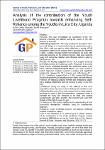| dc.contributor.author | Achiro, Dorky Elizabeth | |
| dc.contributor.author | Mwesigwa, David | |
| dc.date.accessioned | 2023-02-13T06:33:25Z | |
| dc.date.available | 2023-02-13T06:33:25Z | |
| dc.date.issued | 2023 | |
| dc.identifier.citation | Elizabeth, A. D., & Mwesigwa, D. (2023). Analysis of the contribution of the Youth Livelihood Program towards enhancing Self-Reliance among the Youths in Lira City, Uganda. Journal of Social, Humanity, and Education, 3(2), 157-171. | en_US |
| dc.identifier.uri | https://doi.org/10.35912/jshe.v3i2.1337 | |
| dc.identifier.uri | http://ir.lirauni.ac.ug/xmlui/handle/123456789/508 | |
| dc.description.abstract | Purpose: This study investigated the contribution of the YLP
towards enhancing self-reliance among the youths in the west
division of Lira City.
Methodology/approach: The study employed a descriptive cross sectional design. A closed-ended structured questionnaire with a
five Likert scale was used to collect data from a sample of 249
respondents based on the program theory postulated by Reynolds
(1998); it entails the logic behind how programs are built, with
particular emphasis on the program process. Data were analyzed
using both descriptive statistics and inferential statistics aided by
SPSS (version 20).
Results: The findings suggested that the YLP program enhanced
self-reliance among the youths by 11.1%. The youths in Lira City
West Division moderately benefited from livelihood support (3.10,
SD = 1.08) and institutional support (Mean = 2.71, SD = 1.241). A
robust regression analysis revealed a positive and significant
relationship between the YLP program and self-reliance (R2 =
0.111). Livelihood support (Coef = 0.159, p-value 0.0025) was
found to be positively and significantly correlated with self-reliance.
However, the statistical analysis revealed that institutional support
had a negative relationship with self-reliance (p-value > 0.05, 95%
CI).
Limitations: During the study, it was difficult to find some
respondents since they were scattered looking for activities to earn
a living therefore extra efforts were ensured such as using research
assistants in order to find the respondents. Inadequate funds to
facilitate the study like transport to the field, and printing
questionnaires were also a problem. The researcher got a loan from
friends and the bank to cover the gap.
Contributions: This study contributes to the understanding of local
community development initiatives using the empowerment
approach. | en_US |
| dc.language.iso | en | en_US |
| dc.publisher | Journal of Social, Humanity, and Education (JSHE) | en_US |
| dc.subject | Youth livelihood program | en_US |
| dc.subject | self-reliance | en_US |
| dc.subject | livelihood support | en_US |
| dc.subject | institutional support | en_US |
| dc.title | Analysis of the contribution of the Youth Livelihood Program towards enhancing Self Reliance among the Youths in Lira City, Uganda | en_US |
| dc.type | Article | en_US |

